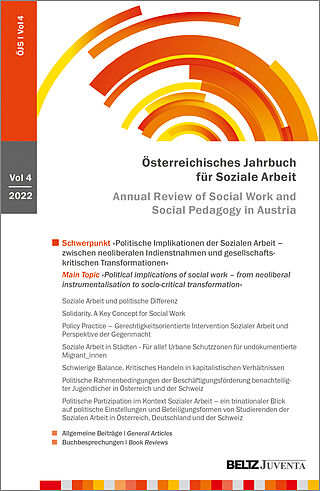- Kinder- & Jugendbuch
-
Fachmedien
- Fachmedien
- Erziehungswissenschaft
- Frühpädagogik
- Pädagogik
- Psychotherapie & Psychologie
-
Sozialpädagogik/Soziale Arbeit
- Sozialpädagogik/Soziale Arbeit
- Übersicht
- PRODUKTE
- Neuerscheinungen
-
ZEITSCHRIFTEN
- ZEITSCHRIFTEN
- Betrifft Mädchen
- Deutsche Jugend
- Forum Erziehungshilfen
- Gemeinsam leben
- Kriminologisches Journal
- Migration und Soziale Arbeit
- Österreichisches Jahrbuch für Soziale Arbeit
- Pflege & Gesellschaft
- Soziale Probleme
- Sozialmagazin
- Theorie und Praxis der Sozialen Arbeit
- Zeitschrift für Sozialpädagogik
- Zeitschrift für Soziologie der Erziehung und Sozialisation
- SERVICE
- Enzyklopädie Soziale Arbeit Online (ESozAO)
- Open Access
- Autor:innen
- Manuskripte
- Soziologie
- Training, Coaching und Beratung
- Sachbuch/ Ratgeber
- Service
- Leseförderung
Österreichisches Jahrbuch für Soziale Arbeit
The Annual Review of Social Work and Social Pedagogy in Austria
Solidarity. A Key Concept for Social Work
Zusammenfassung
This paper advocates an understanding of solidarity that is emancipatory, planetary, self-reflective and aimed at social justice. As global problems such as climate change, war and poverty worsen, it argues that solidarity should be a key concept of social work in the 21st century. It is then social work’s task, as a discipline, profession and field of education, to promote solidary alliances with those conventionally considered to be research subjects, addressees or learners and with the planet itself. These alliances can be brought together under the heading of convivialism, envisioning and enabling a progression from criticising exclusion to achieving the real utopia of an international community based on solidarity. Convivialist ideas see themselves as an alternative to neoliberalism, and aim to transform social conditions, increasing inclusion and sustainability.
Beitrag
Solidarity. A Key Concept for Social Work
Österreichisches Jahrbuch für Soziale Arbeit (ISSN 2628-4502), Ausgabe 1, Jahr 2022, Seite 45 - 63
Titel
Solidarity. A Key Concept for Social Work
Zeitschrift
Österreichisches Jahrbuch für Soziale Arbeit (ISSN 2628-4502), Ausgabe 1, Jahr 2022, Seite 45 - 63
DOI
10.30424/OEJS2204045
Zitation
Caroline Schmitt, Solidarity. A Key Concept for Social Work (2025), Beltz Juventa, 69469 Weinheim, ISSN: 2628-4502, 2022 #1, S.45
Tracked since 05/2018
Angebot für Bibliotheksnutzer:innen
Artikelseite content-select.com
Print ISSN
2628-4502
Verlag
Beltz Juventa
Autoren
Schlagwörter
civil society
social work
inclusion
convivialism
Solidarity
refugee migration
green social work
